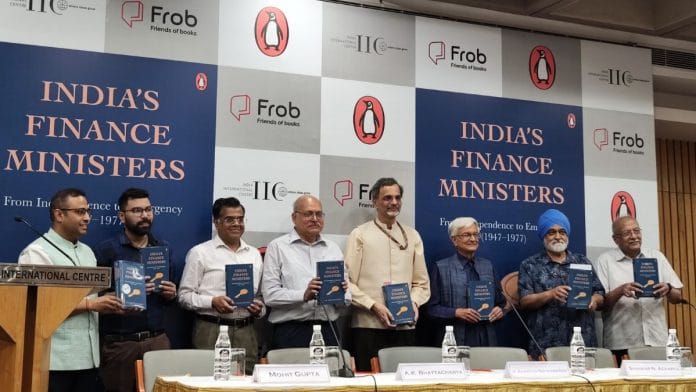New Delhi: During the launch of his new book India’s Finance Ministers: From Independence to Emergency (1947-1977) at the India International Centre last week, author AK Bhattacharya received a pointed critique from prominent economist Shankar Acharya. In a lighthearted exchange, Acharya playfully evaded moderator Mohit Gupta’s “awkward question” before addressing Bhattacharya’s portrayal of the finance ministers, stating that he was “too kind” to them in his narratives about Indian economic history.
Despite the critique, the event was marked by lively discussions and valuable insights from distinguished economists, including Montek Singh Ahluwalia, former deputy chair of the Planning Commission. Besides Ahluwalia and Acharya, economists Nitin Desai and V Anantha Nageswaran shared their views on the book, offering an engaging perspective on the functioning of the finance ministry during the period under review.
Bookended by a nod to the Boston Tea Party as well as an acknowledgement of the absence of women contributors from the moderator, the session saw Ahluwalia delve into the Planning Commission as he harkened back to his experience working at the World Bank.
Also read: Nehru’s amendment to the Constitution was a revolution. Made sedition an invalid law
TTK, Mahalanobis, Nehru and Sita
Ahluwalia credited PC Mahalanobis, the founder of the Indian Statistical Institute, for his influence on the idea that producing capital goods is positive while producing consumer goods is negative.
He shared an intriguing anecdote from the book, recounting a disagreement between Jawaharlal Nehru and then-Tamil Nadu Chief Minister C Rajagopalachari regarding a licence application filed by then-Finance Minister TT Krishnamachari’s family for the production of Pond’s products. Rajagopalachari rejected the application on “very sensible grounds” that Indian women don’t need such products because goddess Sita didn’t.
“[Nehru], who is believed to later be a great devotee of PC Mahalanobis looked at this thing and commented, ‘You know, Sita was naturally beautiful,…not every Indian woman is that well-endowed so let’s approve this thing.’ It was a classic early case that Nehru didn’t have the kind of prejudice against consumer goods that is usually attributed to his government later on,” Ahluwalia quipped.
Ahluwalia also paid tribute to the former finance minister CD Deshmukh, acknowledging his contributions as the founder of the IIC and his role in the reorganisation of Indian states. Tributes to Deshmukh as IIC founder were a recurring theme throughout the talk, with the moderator Mohit Gupta being the first to single out Deshmukh’s significance during his opening remarks
Dawood and a critique of Bhattacharya’s book
But before Ahluwalia took the centre stage, Acharya, who had served as the Chief Economic Adviser from 1993 to 2001, had set the stage with his critique of Bhattacharya’s book, while the author himself was happy to let the panelists take over the discussion.
Acharya pointed out various policy failures, including the infamous “Hindu rate of growth”, import restrictions, state regulations, and the rise in marginal tax rates during the period covered in the book. He said Bhattacharya had not been critical enough when discussing the finance ministers and their policies.
Acharya, however, did lighten the atmosphere by bringing up the Gold Control Rules of 1963, implemented during Morarji Desai’s tenure as finance minister, for which the likes of notorious crime lord Dawood Ibrahim are “very thankful”.
“It is a mixed blessing, 30 years of policy, and I think you’ve been too kind. But despite that, I must thank you,” Acharya concluded.
(Edited by Prashant)






